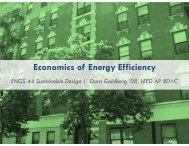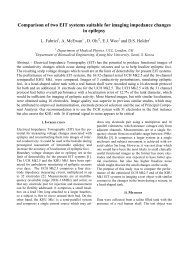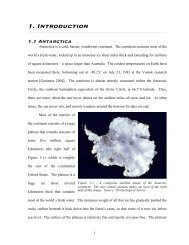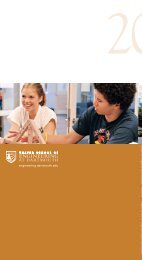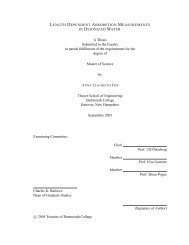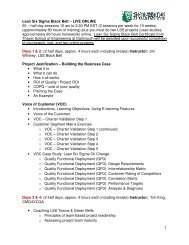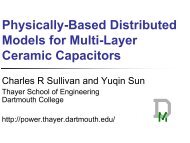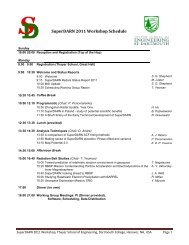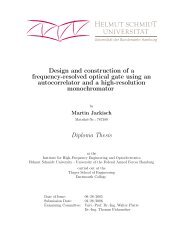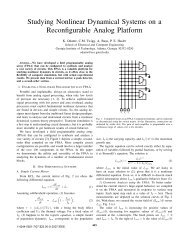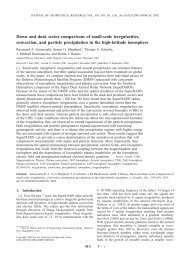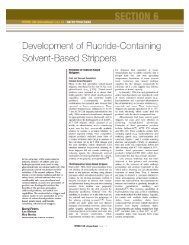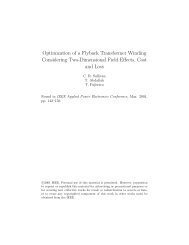Courses Programs - Thayer School of Engineering - Dartmouth ...
Courses Programs - Thayer School of Engineering - Dartmouth ...
Courses Programs - Thayer School of Engineering - Dartmouth ...
Create successful ePaper yourself
Turn your PDF publications into a flip-book with our unique Google optimized e-Paper software.
undergraduate courses<br />
82<br />
COSC 8 Problem Solving with Computer Science<br />
Offered: 10F: 10 11W: 10<br />
Motivated by applications in the arts, sciences, social sciences, and computer systems,<br />
this course develops skills in solving problems computationally. Topics covered include<br />
representation (how to capture computationally the objects and processes <strong>of</strong> a problem),<br />
abstraction (how to build high-level, multi-purpose toolkits for manipulating<br />
representations), recursion and modularity (how to break problems into subproblems<br />
and combine solutions), reasoning (how to understand what a computation is<br />
doing), and concurrency (how to deal with multiple simultaneous processes). These<br />
concepts are taught within a functional programming language that supports them<br />
well; they are applied in a series <strong>of</strong> programming labs solving application problems.<br />
Prerequisite: Computer Science 5 or Advanced Placement.<br />
Dist: TLA<br />
MATHEMATICS<br />
MATH 3 Introduction to Calculus<br />
Offered: 10F: 9, 11, 12 11W: 10, 11<br />
This course is the basic introduction to calculus. Students planning to specialize in<br />
mathematics, computer science, chemistry, physics, or engineering should elect this<br />
course in the fall term. Others may elect it in the winter.<br />
A study <strong>of</strong> polynomials and rational functions leads to the introduction <strong>of</strong> the<br />
basic ideas <strong>of</strong> differential and integral calculus. The course also introduces exponential,<br />
logarithmic, and trigonometric functions. The emphasis throughout is on fundamental<br />
ideas and problem solving.<br />
MATH 3 is open to all students who have had intermediate algebra and plane<br />
geometry. No knowledge <strong>of</strong> trigonometry is required. The lectures are supplemented<br />
by problem sessions.<br />
Dist: QDS<br />
MATH 8 Calculus <strong>of</strong> Functions <strong>of</strong> One and Several Variables<br />
Offered: 10F: 10, 11, 12 11W: 11, 12, 2 11S: 11, 2<br />
This course is a sequel to MATH 3 and is appropriate for students who have successfully<br />
completed an AB calculus curriculum in secondary school. Roughly half <strong>of</strong> the<br />
course is devoted to topics in one-variable calculus: techniques <strong>of</strong> integrations, areas,<br />
volumes, trigonometric integrals and substitutions, numerical integration, sequences,<br />
and series including Taylor series.<br />
The second half <strong>of</strong> the course generally studies scalar valued functions <strong>of</strong> several<br />
variables. It begins with the study <strong>of</strong> vector geometry, equations <strong>of</strong> lines and planes,<br />
and space curves (velocity, acceleration, arclength). The rest <strong>of</strong> the course is devoted<br />
to studying different calculus <strong>of</strong> functions <strong>of</strong> several variables. Topics include limits<br />
and continuity, partial derivatives, tangent planes and differentials, the Chain Rule,<br />
directional derivatives and applications, and optimization problems including the<br />
use <strong>of</strong> Lagrange multipliers.<br />
Prerequisite: MATH 3 or equivalent<br />
Dist: QDS



